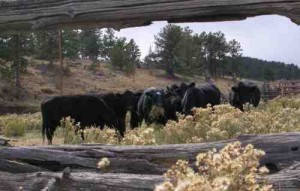Review by Slim Wolfe
Rural Life – January 2008 – Colorado Central Magazine
Land That Moves, Land That Stands Still
by Kent Nelson
Publishedby Viking in 2003
ISBN 014200460X
IF YOU KEEP HORSES but have no time to ride, you may connect with this tale of an alfalfa farm. It’s set near the Black Hills, but might have been in Colorado or anywhere with land wide and flat enough for center-pivot irrigation. And the characters seem like the usual suspects on many a local ranch.
Though Kent Nelson’s motley crew and string of calamities seem real enough, the central character is the ranch itself and the work and sacrifice it extracts from the folks who come into its orbit. Nelson devotes almost as much energy to describing fence-pounding and tractor-wrenching as he does to the people and their peripheral, almost incidental, lives.
But there’s no lack of drama, personality, action, chaos and confusion, and even sex and violence, though sadly enough there’s no dog.
Nelson also offers a subplot of concealed homosexuality which, after all the other ingredients, almost seems superfluous, but he spares us the intimate details and uses it mostly as an added source of confusion and woe. In the end, the leading female and all the other characters (the good ones, anyway) are redeemed by their dedication to making the ranch into a going concern.
Nelson also spices up the tale with no-good-nik neighbors, a racist sheriff, a relocated Mexican, and a couple of ranch hands. He’s at his best presenting the blond female drifter who’s mighty handy with a set of wrenches, but all his characters are well-drawn and his descriptions of the natural terrain and the neighborhood are skilled and not overblown.
It might have been more interesting to meet this couple as newlyweds, just transplanted from their New England artsy-educated youth, struggling to learn the elements of dryland farming, but this is a minor quibble. Nelson, who lives in Salida, has offered up a good dose of western reality, a look at life at the end of the dirt road, where lives are consumed and redeemed by modern agribiz.


